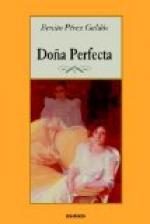The fruition of this period of growth has been seen since the middle of the century, and to-day Spanish novelists easily hold their own with the best of the world. Indeed, in the opinion of many well qualified to judge, there is in no language at the present time a body of fiction more original, more various, more genuinely interesting than Spanish authors have produced. Juan Valera, Pedro Alarcon, Jose Maria Pereda, Armando Palacio Valdes, the Padre Luis Coloma, Dona Emilia Pardo Bazan, and, last, the author of the present volume, Benito Perez Galdos, have succeeded along very different lines, and with striking independence of manner, in composing a mass of fiction which depicts the real Spain of to-day perhaps more adequately than the novelists of any other country have been able to render their native land. The reader of Valera is filled with perpetual admiration of his fine cosmopolitan scepticism, combined with rich traditional culture of the true Spanish type, rendered in a subtle, gay, delightful style that derives from the purest sources of sixteenth-century Spanish. In Alarcon Spanish irony and Spanish rhetoric (l’emphase espagnole, as the French call it) combine in rarely personal admixture. Pereda studies the crude and homely life of the region of Santander with the care for detail of the most scrupulous realist, but without the hard and brutal curiosity about the merely external that realism adopted as a literary creed seems to bring with it. Valdes and Coloma and Senora Bazan, writing from very different points of view, all reproduce for us with sure touches the sentiments and ideals, the virtues and vices of Spanish society, high and low, urban or rural, of to-day. And Perez Galdos, the most fruitful of them all, has embraced the entire century in his work, and affords us, on the whole, the clearest and fullest account of the recent spiritual and social life of his nation anywhere to be found.




